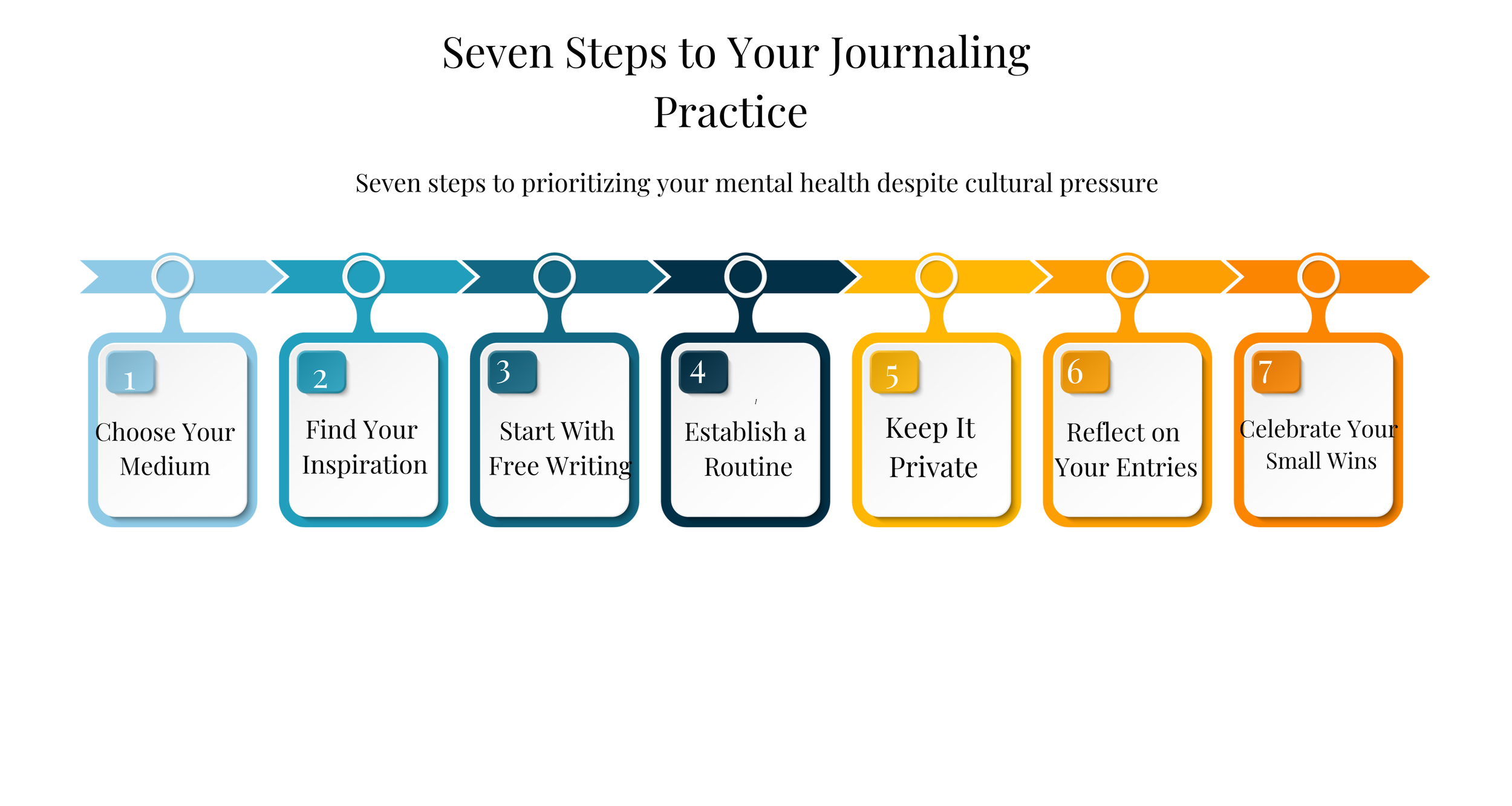Unlocking Emotions: The Power of Journaling in AAPI Self-Care
How Can We Prioritize Our Mental Health in a Culture That Makes Success Mean Everything?
In the AAPI diaspora, for many, success is often equated with high achievement, wealth, and societal approval. This mindset can create immense pressure, leading individuals to prioritize work and external validation over their mental well-being. However, it is crucial to recognize that mental health is only a part of success and is a foundation for achieving our goals and leading fulfilling lives.
Here are a few ways to prioritize mental health despite these cultural pressures:
Redefining Success—Growing up, we knew success as societal expectations. Now, we can discover what success truly means to us.
Create Safe Spaces—Let's actively create and seek out places where mental health can be openly and supportively discussed. These safe spaces can be found in support groups, among family or friends with similar experiences, or online communities prioritizing mental well-being.
Integrate Self-Care Practices - As Asian American children, self-care is not modeled for us as children in the most modern way. We never saw our parents having baths to relax, but at most, they would exercise. Find and schedule out activities that can help you focus on your mental well-being
Seek Professional Help—There’s only so much we can do on our own, and that’s okay. Asking for help in the form of a therapist is not a weakness. Therapy can help us become more emotionally resilient and offer tools to navigate our cultural heritages and emotional challenges.
What is Journaling?
Journaling is the practice of writing down anything you wish—thoughts, feelings, experiences, or aspirations. It can be a very powerful tool for self-reflection and emotional release. Writing, or typing, can help articulate emotions, clarify your thoughts and feelings, and process your experiences in a private place. This privacy can help to begin a journey to honesty and vulnerability.
For those in the AAPI community, it can help encourage us to self-explore, process emotions, and allow for personal growth. Here’s how it can play a vital role in our self-care:
Emotional Release - Writing down your feelings can provide a safe outlet for emotions that may be difficult to express verbally. In a culture where emotions aren’t talked about directly, this can help us bring clarity and relief to our burdened souls.
Self-Reflection—Writing in our journals can help us be self-aware and encourage individuals to reflect on their experiences, thoughts, and emotions. This can help us see patterns and triggers, which allows us to navigate emotional challenges more easily.
Goal Setting - Journaling can be a space to set actionable goals and articulate aspirations. This can help align your pursuits with your values rather than just societal or cultural pressure.
Cultural Exploration—Journaling can serve as a means to explore our cultural heritage, identity, and experiences. It can allow us to connect more deeply to our roots while we navigate the world around us.
The Benefits of Journaling For Mental Health
Journaling allows for emotional release and is a healthy way to cope with challenging days. It can also aid in self-discovery and allow you to connect to your heritage.
Seven Steps to Your Journaling Practice
Choose Your Medium—Decide whether you prefer pen and paper or typing into a digital medium. Each option has its benefits: Writing by hand can feel more tactile and personal, while a digital format is convenient for on-the-go journaling.
2. Find Your Inspiration - Inspiration can come from anywhere—a song, a conversation, or even the view outside your window. If you’re unsure where to start, refer to the journal prompts provided later in this article.
3. Start With Free Writing - Free writing involves writing whatever comes to mind without worrying about structure, grammar, or punctuation. Set a timer for 5-10 minutes and let your thoughts flow freely onto the page.
4. Establish a Routine - Consistency is critical to building a journaling habit. Choose a time that works best for you—morning, noon, or night—and block it off in your schedule. Regular journaling can significantly benefit your mental health.
5. Keep It Private - This freedom allows you to express your thoughts and feelings openly, which is especially important for those in the AAPI community.
6. Reflect on Your Entries—After a while, take some time to look back at your previous entries. You might discover insights and patterns that can help you better understand your emotional journey.
7. Celebrate Your Small Wins—Acknowledge and celebrate your journaling efforts, regardless of how small they may seem. You move toward a clearer mind and greater self-awareness each time you write.
Journal Prompts
First, grab a writing utensil, journal, or notebook and choose a journal prompt. Choose one or two that resonate with you and allow yourself to write without concerns about grammar, punctuation, or length.
Emotional Check-In: What emotions am I feeling right now?
Cultural Reflections: How do my cultural values influence my view of success?
Gratitude Focus: What are three things I am grateful for today?
Aspirations: What are my personal dreams, and how do they align with my family’s expectations?
Moments of Joy: Reflect on a moment I felt happy. What contributed to that feeling?
Challenges Faced: What is a recent challenge I faced, and what did I learn from it
Coping Strategies: What healthy coping strategies can I use when I feel stressed?
Affirmations: What are three positive affirmations I can tell myself?
Cultural Heritage: What aspects of my heritage are I proud of? How can I incorporate these into my daily life?
Future Vision: Where do I see myself in five years? What steps can I take today to move toward that vision?
Dear Therapy® Invitation:
Starting a journaling practice can be transformative. A suitable medium, inspiration, and routine can establish a safe emotional expression and self-discovery space. Embrace the journey!
In the comments below, we invite you to start your journal practice with this: What journaling medium will you try first? What inspires you to begin?


